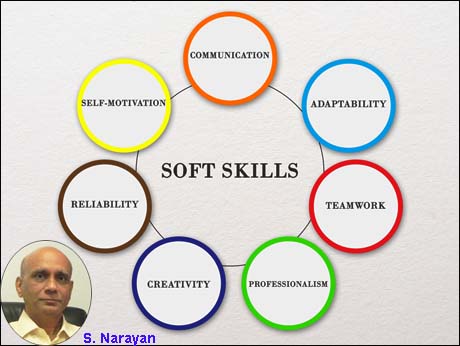
S Narayan, Founder & Managing Partner, Lift Academy suggests why soft skills are just as important as domain knowledge...
Consider the following situations, all real:
Obviously, all of them are trained to perform on the job either before hiring or after hiring. Do they all deliver and are they all happy? The answer is no.
When dealing with front line employees at the bottom of the pyramid, hired directly by companies or through staffing providers, many other factors come into play. Unlike higher level employments which demand certain educational qualifications and experience, these people are raw. They come from a background where they have not been exposed to the lifestyles and environment they would be experiencing in their places of work or residence when they migrate for employment. They also do not have any experience of working in an organized sector. This puts a lot of emotional and other stress on them and is a major cause of attrition or underperformance on the job.
Recognising this, mature organisations do not stop at training them only on domain skills. Additional training is provided which are called by many names – Soft Skills, Life Skills, Employability Skills, Social Skills etc. which aim to prepare these people for life in and beyond the working space. These range from personal hygiene to attitudes to self-respect to communication to inter-personal relationships. Research studies have classified these under various categories to analyse their relevance to the jobs. Some of these are:
One of these researches have shown that 60% of the respondent feel that Soft Skills are as important as domain skills and another 17% have indicated that they are more important for entry level jobs. This is borne out by the fact that last year all students who passed out of a mechatronics course conducted by an ITI in Maharashtra failed to find jobs as the companies they interviewed with found them to have no Employability Skills. This has initiated an Employability Skills course in some ITIs.
Amongst the various categories listed above Communication has been ranked as the main requirements by companies in Office Occupations, Trade and Logistics, Healthcare and Manufacturing while highly regulated industries demand Professionalism or Integrity as a prime requirement. Manufacturing industries consider Teamwork as an important criterion while Healthcare places a high value on Self- Motivation and Reliability.
In our country, particularly, where people come from different States each with its own language and culture and where migration means working and living amongst people coming from a very different backgrounds adaptability and resilience become imperative. Most of them tend to think they are compelled to live in such alien environment just to earn a living and survive. Once they settle down and adjust to the new environment they ease into a more comfortable life both at work and outside.
Another major challenge we have in our country is the wide variations in social behavior and morals at different segments of the society. When people migrate to urban or manufacturing centres, they carry their beliefs, behaviour and attitudes from where they come from. This contrasts with their colleagues’ background and the locals’ beliefs and behaviour leading to stressful situations and potential conflicts. This needs to be addressed too.
We at LIFT Academy and Integron, therefore, train people in just not Domain Skills but also Soft Skills, we call them Service Excellence Model, and Values both before employment and subsequently. Our experience has been that this has led to greater stability and lesser attrition and individual growth even at entry level jobs.
July 29 2016
Lift Academy (www.liftacademy.in) , a training, and skilling solutions provider in the domains of Logistics, Hospitality, and Employability skills across sectors is an affiliated training partner for National Skills Development Corporation (NSDC) and Tourism and Hospitality Skill Council (THSC).